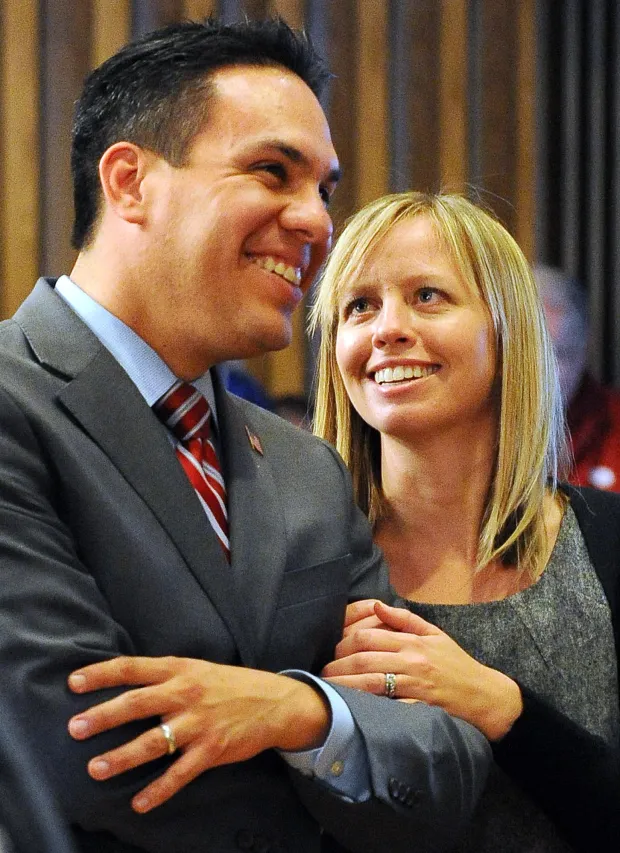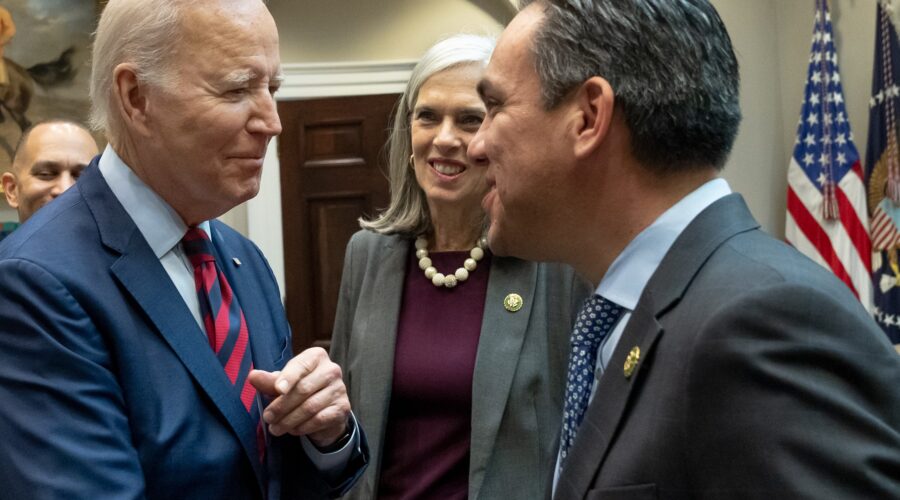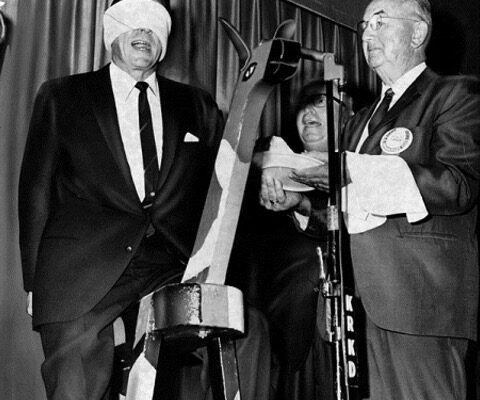By TONY CASTRO
ON THE MORNING OF JANUARY 20, 2009, I am about 75 yards away from where Barack Obama would soon place his hand on the Bible used by Abraham Lincoln at his 1861 inauguration and recited the presidential oath administered by Chief Justice John Roberts. Several friends and I are sipping tea warmed with Chivas Regal, when one of us poses the question that the historic Obama presidency stirs up in old Texas Chicano activists who never thought we would see the day of the first Black president in America: how long before the first Latino president of the United States?
In the intervening decade and a half, speaking about Latino politics at colleges and universities, it is a question I am most often asked. And my answer is almost always a collection of intelligent sounding soundbites mixed with humor but offering certainly no definitive answer. At best, the answer is complicated.

The names of a handful of Latino senators, governors, congressmen, and maybe even a Supreme Court Justice are often the usual candidates. Notably, though, not a single Latino appears among the candidates for 2024 who could succeed President Joe Biden or replace Donald Trump as the leading challenger. But I can offer a name for perhaps 2028 that may sound as puzzling as that of Barack Hussein Obama did to many back in the year 2000.
Peter Rey Aguilar.
Better known as Pete Aguilar, who since 2015 has been the U.S. representative for California’s 33rd congressional district — renumbered from the 31st after the 2020 redistricting cycle. It is the district that once seemed to be the personal property of the late Jerry Lewis, the longest-serving Republican congressman in California history who stepped down in 2013 after serving 17 terms and who was well liked by both his Republican and Democratic colleagues.
Aguilar served on the Redlands City Council from 2006 until his election to Congress. He was mayor of Redlands from 2010 to 2014 during which time he became closely acquainted with Lewis. Aguilar even spoke glowingly of Lewis at his funeral in 2021 as a man who rose to be the powerful House Appropriations Committee’s chair and head the House Republican Caucus.
“He talked about their long-standing friendship going back to when he was mayor of Redlands,” recalled Claremont McKenna political science professor Jack Pitney, who had worked for Lewis.
“It’s no coincidence they got along so well, because Jerry was pretty much like that too. He was not a cultural warrior. He had a conservative voting record, but he made a point of befriending people on the Democratic side.”
So perhaps it is only to those outside California’s Inland Empire that Aguilar has so surprisingly emerged as the political darling and rising star of the Democratic party. Today he chairs the House Democratic Caucus, he’s the highest-ranking Latino in Congress and now also heads up the Democrats’ campaign to recapture control of the House of Representatives — with a Herculean promise to flip five GOP-held congressional seats in his home state alone.
“He’s also the highest-ranking Californian in Congress today,” says Rep. Lou Correa, D-Orange County, of his fellow Golden State congressman. “And he’s got a big responsibility of representing the interests of the biggest state in the union. I think Petey has really grown into the position of leadership.
“He doesn’t hesitate to tell it the way it is, and that’s what I like about the guy. He’s many times unfiltered, he’ll tell you what he thinks, but that’s good, you want some transparency when you’re negotiating with somebody. You want them to tell you exactly where they’re coming from, so you can better get to the point where you want to get faster.
“He’s got a good head on his shoulders, and I think Petey’s not done. Petey’s going places.”
He is not alone. Petey is 44 now, but solidly of California Inland Empire roots. Born in Fontana, Aguilar grew up of Mexican descent in a working-class family in San Bernardino. He graduated from the University of Redlands, where he studied government and business administration.
He and his wife Alisha, a Student Financial Services director at the University of Redlands have two sons, Palmer and Evan, they are raising in San Bernardino, even as Aguilar spends 34 weeks a year serving in Congress in Washington, D.C.
“The Inland Empire is always home — and it will always be home,” Aguilar says. “My parents, my grandparents, were born and raised here. I’m raising my kids in public schools here. This place is always going to be home. And I’m always going to want to come back home.”
Kevin Dyerly, who roomed with Aguilar in college, remembers his friend “getting up at the crack of dawn on Saturdays to coordinate a student project for Habitat for Humanity.

“He has always cared deeply for his community,” says Dyerly, “and the quality of life for people within it.”
In 2015, when he was a freshman congressman, Pete and Alisha completed a week-long SNAP challenge, where they could not spend more than $4.73 per person, per day on food — the average benefit for California’s Supplemental Nutrition Assistance Program (SNAP) recipients. They did the challenge to raise awareness for nutrition and hunger throughout the Inland Empire and “to better understand what thousands of families on SNAP throughout San Bernardino County go through every day.”
At the age of 21, Aguilar served as deputy director for Gov. Gray Davis’ Inland Empire office — four years before he was appointed to the Redlands City Council. Then in 2014, Aguilar was elected to the House of Representatives, easily winning reelection four times since then.
“He’s not afraid to take a different side than yours” says Carole Beswick, CEO of the Inland Action think tank, who has known Aguilar for more than a decade. “But he’ll listen. He’ll be respectful, and he’ll consider what you’re saying. You may not have persuaded him, but you know he’s heard you.”
Rep. Ted Lieu, D-Manhattan Beach, who was part of the same Congressional freshman class that year, said Aguilar puts on no airs or pretense.
“He’s the same guy as he is back home,” he said. “He doesn’t change when he’s in Congress.”
“Mr. Aguilar,” The New York Times wrote, sizing him up, “is known for his affable demeanor and his ability to bring together the various flanks of the party and cut deals with Republicans.”
Politico.com has gone so far as to say, “This California Democrat Might Be the Future of the Party.” The Future of the Party. What could that mean? His hometown newspaper, the San Bernardino Sun wrote a long piece on Aguilar and, ultimately, could only speculate “Future Speaker?” But that was hardly a revelation. A year ago, the Washington Post reported that “close friends view Aguilar as the man who could become the first Hispanic speaker of the House.”
But then, Aguilar was practically unheard of, except maybe in his district and in the Latino Caucus, until last year when then House Speaker Nancy Pelosi tapped him to serve on the House January 6th Committee.
The day of the rioting insurrection at the U.S. Capitol would alter Pete Aguilar’s life. One moment he is preparing with other congressmen to confirm Joe Biden as the nation’s next president. The next he is fleeing the chamber floor for his life from the attack on the Capitol. As he scrambled to leave, Aguilar scribbled in a little red notebook he carried.
“I’m a little scared.”
As it turns out, that day, and what came afterward, catapulted him into the forefront of the nation’s leadership and a position of prominence and power he had never actively sought.

What role that might ultimately be is up to Aguilar and the turn of events ahead of him, which essentially have dictated his political opportunities. For his part, he says he has no ambition beyond where he is in the House. It’s the one thing Nancy Pelosi says she loved most about him as he was coming up: “He was a House guy.”
But Aguilar is not a loyally blind “House guy” or congressional leader, as two recent positions have made that evident.
In September, he called for Sen. Bob Menendez (D-N.J.) to resign for allegedly pocketing bribes in a wide-ranging corruption case, adding that discrimination against Latinos should not be conflated with Menendez’s indictment.
Then in early November, Aguilar slammed Rep. Rashida Tlaib (D-Mich.), the only Palestinian American member of the House, after she accused President Biden of supporting Palestinian “genocide.”
He is, after all, a fierce supporter of President Biden, who while vice president in 2014 had stumped in California for Aguilar who was running for Jerry Lewis’s old House seat after having lost his first congressional campaign two years earlier to the incumbent that he was now trying to oust.
Biden said Aguilar “understands that every single solitary child out there deserves the same chance he (Aguilar) had,” and that the “American people are tired of standing still.”
“Do not let this man lose. We need him,” Biden told the Colton High School gymnasium standing-room-only crowd. “Get out the vote!”
Aguilar won and Pelosi was soon so impressed with the young congressman that she fast-tracked him to a seat on the Appropriations Committee.
“He has all the talent,” she says “He’s articulate and eloquent. He is values-based. He knows the subject matter.”
Pelosi has also done more than just mentor him. She has connected him with top California donors and introduced him to her California inner circle to ensure that he is well positioned both in Washington and in their home Golden State.
But she had to convince him to accept serving on the high profile Jan. 6 committee position that raised his visibility and made him the rising star he’s become.
Aguilar feared how the job of investigating Donald Trump’s violent extremists might put his wife and two sons at risk.
“I didn’t need the death threats,” he recalled thinking.
But it may be that the role of investigating and helping prosecute a disgraced president’s criminal thugs will yield the biggest payback of his life.
As such, Aguilar has now assumed a new role: mentor and guide while hoping he might follow in the footsteps of Pelosi and eventually the leader for the next generation of California Democrats in Washington.
“I benefited from learning from her,” Aguilar says of his mentorship under Pelosi, “spending time with her, watching her build relationships. Nobody is going to recreate that in four months.” And it may be that Aguilar fits the bill that most perfectly matches what the Democrats need today because of his heritage. What is the future of Latinos within the Democratic Party, and can the party hold on to the increasingly massive Latino vote in future national elections?

Those are questions of growing concern to Democrats as polls show that President Biden is losing support among Latino voters, who are potentially the swing vote in a presidential campaign not only in the traditionally large Latino population states like California and Texas but also in the southwest, parts of the Midwest and south as well as in some northeastern states.
Aguilar isn’t giving up, but he understands that the issue is more complex than many Democrats and Democratic party leaders make it out to be.
According to the Washington Post, “Aguilar has grown frustrated with how Democrats treated all Hispanics with a broad brush, leading to a troubling decline in political support from that voting bloc. The anti-police rhetoric cost Democrats votes in South Texas, he said, where a huge portion of Hispanic families work for the Border Patrol or local law enforcement.”
“They’re very different,” he said, referring to the different nationalities of Latino voters. “How you talk to a Mexican American in Southern California versus a Cuban American in South Florida, we have to acknowledge that we can’t have boilerplate campaign literature.”
Not lost in translation, however, is the idea that Latino voters aspire to the same thing most Americans have wanted.
“I think the Latino Dream is the American Dream,” says Aguilar, “and it’s a better quality of life for our kids. It’s clean air and clean water, safe communities, safe streets, good schools — those are things that the Latino community wants — and those are things that thankfully, the Biden-Harris administration wants to invest in.
“I do think that there’s always an opportunity to get in front of our voters to get in front of our constituents, and the Latino community and to share exactly what we’ve done. So rather than treating people as just ‘of course, they’re going to be with us,’ we need to convince them, and we need to talk with them. And we need to engage with them about what we’ve done…
“The role that the Democratic caucus put me in to do, that is important. It’s historic, it’s significant. And it shows how far we’ve come as a country.”
Tony Castro, the former award-winning Los Angeles columnist and author of CHICANO POWER (E.P. Dutton, 1974), is a writer-at-large with LAMonthly.org. CHICANO POWER will be republished in a 50th anniversary edition in 2024. He can be reached at tony@tonycastro.com.

CHICANO POWER 50 Years Reflections is a series of stories examining the Latino civil rights history of the more than five decades since the advent of the Chicano Movement in Southern California and the LA County Sheriff’s deputy shooting death of Los Angeles Times columnist Ruben Salazar whose reporting on inequities and discrimination against Latinos underscored those social, economic and political injustices.
Journalist and author Tony Castro, who in 1978 succeeded Salazar as the leading Chicano voice in a city of almost four million of which more than half are Latino, ruminates about the Chicano Movement today and about Latinos in faithful pursuit of the American Dream: their progress amid broken promises and ongoing challenges faced by Latinos in politics and in all aspects of life — and in particular about the special difficulties of Latino columnists following in Salazar’s footsteps.
In these stories of deep reflection and mesmerizing storytelling, Castro invites readers into the world of Latinos, his world, chronicling the experiences about race, culture, identity, and belonging that have shaped those who led the movement, as well as himself. As much as this story is about adversity, it is also about tremendous resilience. And Castro pulls back the curtain and opens up about his career and personal life — and his struggles balancing himself in a society discriminating against so many like him, and his journey toward open heartedness.
Castro, a Nieman Fellow at Harvard, was an award–winning columnist for the Los Angeles Herald Examiner, writing in the southwest, and in central America in the late 1970s and 1980s. He later covered politics and civil rights for the Los Angeles Daily News.
Top featured image, photo caption: President Biden is now counting on the political darling and rising star of the Democratic party, Pete Aguilar, who chairs the House Democratic Caucus, is the highest-ranking Latino in Congress and now also heads up the Democrats’ campaign to recapture control of the House of Representatives — with a Herculean promise to flip five GOP-held congressional seats in his home state alone.





